
The right answer depends on your business growth goals.
If your CDB company is exceeding sales numbers and has ambitious growth goals, you may have to decide if you want to build up your operations or turn it over to a co-packer. It's a tough choice, and it depends on your financial position, market fluctuations, how big your output is vs. how big you want it to be, and much more.
In this article, we'll help you decide whether to leave the production hassles to a co-packer or if it's time to overhaul your production facility with new equipment.
What is a Co-Packer?
Let’s start with the basics. A co-packer, or contract packager, can take care of some or all of the production process. This could be mixing the ingredients to make your CBD product, filling containers, labeling bottles, storing the final packaged products, and even shipping to customers or retailers. Or, it might only be a couple of those things, and possibly just one of them.

Co-packers tend to be large operations that cater to large companies, so if you’re a startup or just small in size and output, it can be difficult to get a co-packer to serve your needs. The problem is threefold.
- Large co-packers generally require large minimum orders that are beyond the capability and budget of small companies. If you manage to get a contract with a large co-packer, your small order will probably put you at the bottom of the pecking order. It's not that they don't care about your business. It's just not their top priority. For them to make a profit, they need to focus on the largest orders first. As a result, your wait times might be longer than you can stand.
- Medium and small co-packers do exist, but they are harder to find. The nearest Goldilocks zone “just right” co-packer might be several states away, creating new logistical headaches. Can your ingredients survive the trip without getting damaged? How much additional cost will you sustain in shipping and storage? Can they grow in output alongside you, or will you have to be searching for a new co-packer sooner than you’d like?
- If the co-packer you like doesn’t have a marijuana license, then it doesn’t matter how great they are in every other respect. They can’t legally make your product, so a contract is a no-go. That said, you can enter an agreement if they have a marijuana license and you don’t. It’s a little more complicated, but it can and does work.
Let’s say you overcome these issues and find the perfect co-packer to handle manufacturing, bottling, storing, and shipping. They’re close by and have an amazing reputation. Now what?
When you pick up the phone to find out if they can work with you, they’re going to pepper you with questions for which you’ll need to have answers. You’ll need to have more info than “our CBD oil smells like fresh-cut pine and can help reduce stress.” That’s a line for the marketing department.
The co-packer is going to think like a scientist, and so must you. What’s the pH, the viscosity, the exact ingredients, the mixing technique, the shelf life, your minimum order amount, to which state or states will you be marketing and selling? They’ll need to know exactly how to replicate (or if they can replicate) your product with their facility and where it can legally be shipped and sold.
Do You Need a Co-Packer?
Now that you know what a co-packer is, let’s take a look at how you can determine whether or not you need one and, if you do, how to pick the right one. Here are some signs that you should start looking for outsourced production or packaging.
- You can’t keep up with demand.
- Your quality suffers when you try to increase production rates.
- You pay too much for your ingredients and materials because you can’t get them in big enough bulk orders.
- You don’t have enough storage for your product.
Now, these could also be signs that it’s time to overhaul your production line, but there may be other factors swaying you in one direction or the other.
If you can’t expand your facility because you just don’t have enough room, or you need help refining your product and packaging process but don’t want to spend time and money on your R&D, then maybe purchasing new machinery isn’t for you.
Plus, co-packers, thanks to their experience, can sometimes hand you incredible new ideas for products. But if you want ultimate control over your product line and have room to expand operations, then replacing, upgrading, or adding new machines could be your ultimate solution.
If You’re Keeping Work In-House, What Equipment Do You Need?
Let’s say you’ve decided against hiring a co-packer, and instead, you want to overhaul your production line. In this case, there are still many details to consider. Here are a few.
- If your operation has been largely or entirely done by hand up to this point, or you’ve been using slow, inefficient machines that need replacing, you’ll have to buy new equipment and retrain your employees.
- You’ll need to consider the layout of your facility and make sure your machines work well with each other so that your lines are efficient.
- Along with your production increase, storage will have to increase to make room for all your products.
- Then there are considerations regarding bulk orders of containers, ingredients, labels, boxes, shipping services — basically everything needed to go from raw materials to a product on store shelves or into a delivery box.
Once you have all these factors considered and accounted for, then it’s a matter of getting the right machines in place. First, you’ll need equipment to put your CBD product into containers, such as the FL-12 Compact Automatic Filling Machine. It can handle oil-based fluids of varying viscosities and accurately fill up to 30 bottles per minute.
To seal your CBD bottles, you’ll need a capper, like the CP-10 Semi-Automatic Capping Machine. Capping machines take the guesswork and error out of applying caps to containers because they use consistent torque every time.
As for labeling, you can go with wrap-around labels and a labeler like the ELF-50 Labeling Machine, which is perfect for small operations who want professional results and fast output. Or you can choose to go with a shrink sleeve labeler like the SL-77. Shrink sleeves cover the entire container, giving you more space for graphics and logos, plus it gives you the ability to add tamper-evident sealing.
All of our equipment is modular for easy expandability and compatibility with the rest of your production line. Plus, repair and maintenance are easy to schedule, and technical support is available 24/7 to help troubleshoot any issues.
For more valuable information on filling, capping, and labeling CBD oil, read the article, Insights into Filling, Capping, and Labeling CBD Bottles.
.webp?width=200&height=114&name=2x-Packleader-logo-large%20(1).webp)

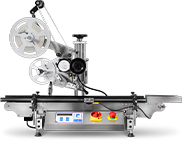
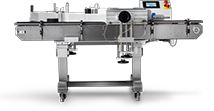
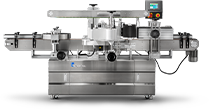
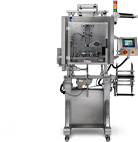
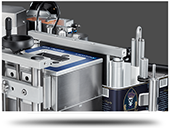
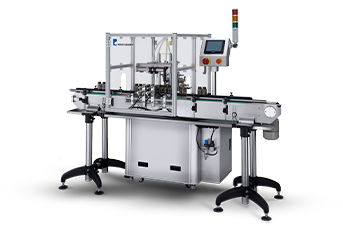
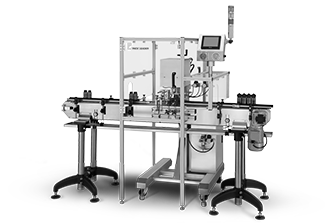
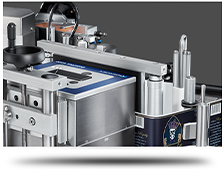






.webp?width=360&name=2x-color-logo%20(1).webp)